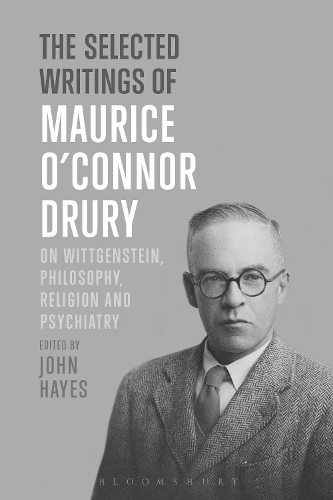
The Selected Writings of Maurice OConnor Drury: On Wittgenstein, Philosophy, Religion and Psychiatry
(Hardback)
Available Formats
Publishing Details
The Selected Writings of Maurice OConnor Drury: On Wittgenstein, Philosophy, Religion and Psychiatry
By (Author) Dr Maurice OConnor Drury
Edited by Professor John Hayes
Foreword by Ray Monk
Bloomsbury Publishing PLC
Bloomsbury Academic
21st September 2017
United Kingdom
Classifications
Tertiary Education
Non Fiction
Philosophical traditions and schools of thought
Philosophy
Reference works
Philosophy of language
Psychiatry
Religion and beliefs
824.914
Physical Properties
Hardback
472
Width 156mm, Height 234mm
835g
Description
Maurice OConnor Drury was among Wittgensteins first students after his return to Cambridge in 1929. The subsequent course of Drurys life and thought was to be enormously influenced by his teacher, from his decision to become a doctor to his later work in psychiatry. The Selected Writings of Maurice OConnor Drury brings together the best of his lectures, conversations, and letters on philosophy, religion and medicine. Central to the collection is the Danger of Words, the 1973 text described by Ray Monk as 'the most truly Wittgensteinian book published by any of Wittgenstein's students'. Through notes on conversations with Wittgenstein, letters to a student of philosophy and correspondence of almost 30 years with Rush Rhees, Drury gives shape to what he had learned from Wittgenstein. Whether discussing methods of philosophy, Simone Weil or the power of hypnosis, he makes fascinating excursions into the bearing of Wittgensteins thought on philosophy and the practice of medicine and psychiatry. With an introduction presenting a new biography of Drury, analysing the relationship between him and Wittgenstein, The Selected Writings of Maurice OConnor Drury features previously unpublished archival sources. Beautifully written and carefully selected, each piece reveals the impact of Wittgensteins teachings, shedding light on the friendship and thinking of one of the most important philosophers of the 20th century.
Reviews
Intelligently and humanely curated by its editor, this collection will remain the definitive volume on Drurys life and his lifedefining relationship with Wittgenstein. * Times Literary Supplement *
Splendid book . . . [that] provides an interesting, original perspective on Wittgensteins thought . . . A substantial work excellently assembled and edited by Prof John Hayes. It is of interest to the general reader as well as to students of philosophy or psychiatry. * The Irish Times *
For readers who are too busy, hassled or otherwise preoccupied to read beyond the first lines of this review, I will summarise at this point: this volume is entirely splendid and is, in my view, one of the most important books related to psychiatry in Ireland to be published in recent times. * Irish Journal of Psychological Medicine *
As shown by the work of Strring, Ziehen, Jaspers, Janet, Mourgue, Morselli, Ey, Lanteri-Laura, Martin-Santos, Kimura, etc., the psychiatrist-philosopher remains a cultural archetype. Con Drurys work showed that such a figure was also present in Great Britain. Lovingly edited by John Hayes, this facsimiled volume illustrates the usefulness to Psychiatry of conceptual analysis and of a way of thinking that, alas, is now rarely exercised by its practitioners. * German E. Berrios, Emeritus Professor of Psychiatry, University of Cambridge, UK *
Author Bio
John Hayes is Professor of Philosophy and Dean of the Faculty of Arts at Mary Immaculate College, University of Limerick, Ireland.
